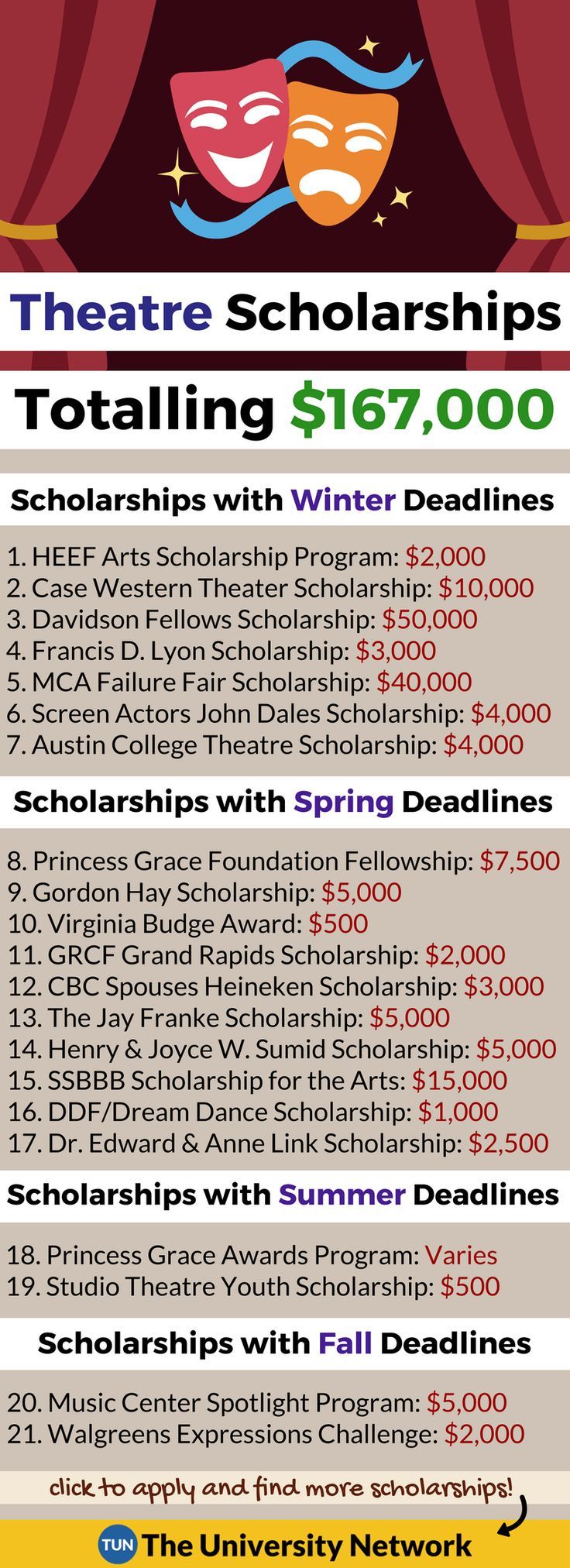
Unveiling the Curtain: Your Guide to Theatre Scholarships
I remember the exact moment the stage lights truly blinded me, not in a literal sense, but in a way that clarified my future. I was fifteen, watching a local production of Our Town, and something shifted inside me. The raw honesty, the shared human experience unfolding before my eyes – I knew, with every fiber of my being, that I belonged up there, telling stories. The dream was vivid, intoxicating, and utterly non-negotiable. But then, as it often does for many young dreamers, reality landed a swift, sobering blow: college tuition. My family, bless their hearts, had always encouraged my artistic pursuits, but the cost of a top-tier performing arts program felt like an insurmountable mountain. It was a classic drama, really, the passionate artist against the harsh financial world, and for a while, I feared the curtain might close before I even got a chance to audition for my own life.
That’s when I first heard whispers of "theatre scholarships." At first, they sounded like mythical creatures, something only reserved for prodigies who could sing opera while tap-dancing and reciting Shakespeare backward. But as I dug deeper, driven by that stubborn artistic spark, I discovered that these scholarships were very real, and more importantly, they were accessible to people like me. They weren’t just for the chosen few; they were for the dedicated, the passionate, the ones willing to put in the work. And let me tell you, finding and securing a theatre scholarship became its own kind of performance, a complex, multi-act play with me as the lead.
So, why do these scholarships even exist? It’s a question I pondered often during my frantic search. It turns out, colleges and universities, along with countless private organizations, genuinely value the performing arts. They understand that theatre students bring a unique energy, creativity, and discipline to their campuses. They know that a vibrant arts program attracts diverse talent and enriches the entire academic community. Moreover, they recognize that not everyone has the financial means to pursue their artistic dreams, and they want to invest in the next generation of storytellers, designers, technicians, and performers. They’re looking for potential, for passion, for that spark I felt watching Our Town. They’re looking for you.
My journey began with a dizzying amount of research. I spent hours hunched over my laptop, typing "theatre scholarships," "acting scholarships," "musical theatre funding," and "drama school grants" into search engines. The sheer volume of information was overwhelming at first. It felt like trying to find a specific prop in a massive, cluttered backstage area. I started by looking at the websites of the universities I was interested in. Most schools have a dedicated financial aid section, and within that, they often list departmental scholarships for specific majors. This was my first major breakthrough: realizing that scholarships weren’t just general academic awards but could be tailored specifically to my craft.
Beyond individual university pages, I ventured into the vast ocean of scholarship databases. Websites like Fastweb, Scholarship.com, and the College Board’s scholarship search tool became my best friends. I learned to filter meticulously, narrowing down options by major, artistic discipline, geographic location, and even specific talents like playwriting or technical theatre. It was like learning a new language, understanding terms like "merit-based," "need-based," and "endowed funds." I quickly realized that a significant portion of my time would be spent not on stage, but at my desk, meticulously reading criteria and deadlines. This initial phase taught me the invaluable lesson of organization; a messy search equals missed opportunities.
As I sifted through the listings, I began to see patterns and categories emerge, which helped me structure my approach. The most common type, and often the most competitive, were the talent or merit-based theatre scholarships. These are the ones that require an audition, a portfolio review, or a rigorous interview. For acting scholarships, this meant preparing monologues. For musical theatre scholarships, it meant songs and often a dance call. If you were eyeing technical theatre or design, you’d need a portfolio showcasing your work – sketches, photos of sets you’d built, lighting plots, costume designs. I remember the sheer panic of realizing I needed to assemble a portfolio for technical theatre, even though I saw myself primarily as an actor. But many programs look for well-rounded individuals, so I started documenting every prop I’d painted, every flat I’d helped construct, every light I’d focused. It was a testament to showing initiative, even if it wasn’t my primary passion.
Then there were the academic-based scholarships, which often surprised aspiring artists. While your artistic talent is crucial, colleges also want students who can succeed in the classroom. Maintaining a strong GPA, taking challenging courses, and demonstrating intellectual curiosity can open doors to general university scholarships that can then be combined with theatre-specific awards. I learned to balance my rehearsals with my homework, seeing my academics not as a distraction from my art, but as another facet of my discipline. An essay for an English class could be just as much a creative endeavor as developing a character.
Need-based scholarships were another critical piece of the puzzle. These are awarded based on a family’s financial situation. Filling out the FAFSA (Free Application for Federal Student Aid) became an annual ritual, a mountain of forms that seemed designed to test one’s patience. But it was essential. Many schools require this to determine eligibility for any financial aid, not just need-based grants. Don’t ever assume you won’t qualify; let the financial aid office make that determination. You might be surprised.
And let’s not forget the more niche or specific categories. There are scholarships for aspiring playwrights, for costume designers, for lighting technicians, for directors, for stage managers. Some are specifically for students interested in classical theatre, others for contemporary works. My friend Sarah, a brilliant aspiring playwright, found a small but significant scholarship specifically for female playwrights focusing on social justice themes. It was a reminder that you don’t always have to fit into the broadest categories; sometimes, your unique artistic voice is precisely what a scholarship committee is looking for. And importantly, don’t overlook local scholarships. Your town’s community theatre, local arts council, or even civic organizations might offer small but valuable awards that are far less competitive than national ones. Every dollar counts!
Once I understood the landscape, my next big hurdle was crafting a compelling application. This wasn’t just about filling out forms; it was about telling my story, about demonstrating my passion beyond just checking boxes. The scholarship essay became my stage for this. I didn’t just write about wanting to be an actor; I wrote about why I wanted to be an actor. I described the moment watching Our Town, the feeling of connection, the power of shared narrative. I talked about a difficult role I played and what I learned about empathy. I focused on authenticity, showing my vulnerability and my unwavering commitment. I tried to avoid clichés and instead, painted a vivid picture of my journey and my aspirations. What makes you unique? What experiences have shaped your artistic voice? These are the questions your essay needs to answer.
Next came the resume or curriculum vitae (CV). This isn’t just a list of productions you’ve been in. It’s a professional document that showcases your experience, skills, and dedication. I included every play, every workshop, every acting class, every technical role I’d ever taken on, no matter how small. Did I help paint a set? Put it down. Did I usher for a show? Put it down. Did I attend a summer theatre intensive? Absolutely put it down. Even skills that seemed unrelated, like proficiency in a specific software program or experience leading a team, found their way onto my resume, demonstrating my well-roundedness and potential value to a program.
Then came the delicate art of asking for letters of recommendation. I chose teachers and directors who knew me well, who had seen my work ethic, my talent, and my growth. I didn’t just ask them; I prepared them. I provided them with a list of the scholarships I was applying for, my resume, my personal statement, and clear instructions on deadlines and submission methods. I reminded them of specific projects we’d worked on together, giving them anecdotes they could use to illustrate my character and abilities. This made their job easier and ensured they could write a truly personalized and impactful letter. Always ask well in advance, giving them ample time; a rushed letter is rarely a good letter.
For those talent-based scholarships, the audition or portfolio was paramount. For my acting auditions, I spent months preparing monologues. I chose pieces that showed range, that I connected with emotionally, and that highlighted my strengths. I worked with a coach, practiced in front of friends, and recorded myself to catch subtle nuances. It wasn’t about perfection; it was about authenticity and demonstrating potential. For musical theatre, choosing the right song was crucial – something that showcased my vocal range and acting ability, but also felt appropriate for my age and type. I learned to dress professionally but comfortably, to warm up properly, and to always, always be prepared with sheet music for the accompanist. Technical theatre portfolios required careful curation: high-quality photos, clear descriptions of my role in each project, and a brief artistic statement about my design philosophy. The biggest lesson here was to show enthusiasm, take direction, and let your personality shine through. They’re not just evaluating your talent; they’re evaluating you.
After submitting all the pieces, some scholarships required an interview. This was often the final hurdle. I researched each program thoroughly, understanding their philosophy, their faculty, and their unique offerings. I prepared thoughtful questions to ask them, demonstrating my genuine interest and engagement. During the interview, I focused on being myself – enthusiastic, articulate, and honest. I talked about my goals, how I envisioned contributing to their program, and what I hoped to gain. It was a two-way street; I was also interviewing them, ensuring it was the right fit for me.
Then came the waiting game, a period filled with more suspense than any play I’d ever been in. The rejections stung, some more than others. Each "no" felt like a personal blow, a judgment on my talent or my worth. I remember one particularly painful rejection from a dream school that made me question everything. But I learned to process it, to understand that a rejection wasn’t necessarily a reflection of my talent, but often about fit, or the sheer number of applicants. I tried to learn from each application, asking for feedback when possible, and always, always moving on to the next opportunity. Persistence became my most reliable co-star.
And then, one crisp spring afternoon, the email arrived. It wasn’t just an acceptance; it was an offer. A substantial theatre scholarship that would make my dream school a reality. The relief, the joy, the sheer disbelief – it was a moment I’ll never forget. It wasn’t just about the money; it was validation. It was proof that all those hours of research, all those late-night rehearsals, all that meticulous essay writing had paid off. It meant I could step onto that stage, not burdened by crippling debt, but empowered to learn, to create, to tell stories.
Looking back, the biggest lesson I learned throughout this arduous process is that theatre scholarships are not lottery tickets. They are opportunities for those who are willing to work for them. They require dedication, organization, and a relentless belief in your own artistic journey. My advice to any aspiring theatre artist reading this, standing at the precipice of their dreams and staring down the financial chasm, is simple:
Start early. The earlier you begin your research and application process, the better.
Be organized. Create spreadsheets, track deadlines, and keep copies of everything.
Don’t self-reject. Apply for every scholarship you might qualify for. Let them say no, not you.
Practice, practice, practice. Whether it’s your audition pieces, your writing, or your interview skills, hone your craft.
Seek feedback. Ask trusted mentors, teachers, or coaches to review your essays, watch your auditions, or conduct mock interviews.
Be authentic. Your unique voice, your true passion, is your greatest asset. Don’t try to be someone you’re not.
Network. Talk to current theatre students, faculty, and professionals. They might know about lesser-known opportunities.
Understand it’s a marathon, not a sprint. The process is long and can be emotionally taxing, but persistence is key.
Your passion is your greatest asset. Let it fuel every step of your application.
The stage is waiting for you. The stories are waiting to be told. Don’t let the financial curtain fall before you’ve had a chance to shine. Theatre scholarships are real, they are attainable, and they could be the very thing that helps you step into the spotlight and fulfill your artistic destiny. Trust me, the journey is worth every moment, and the reward of pursuing your passion without overwhelming financial burden is a performance you’ll cherish for a lifetime. Break a leg.


